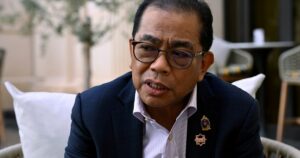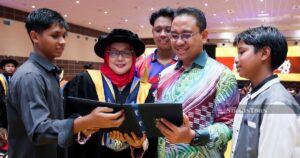“I’M going to kill your son, then I will kill you. After that, I will write a note saying you caused it, before I kill myself.”
The words hit me like a truck. This wasn’t a line from a crime drama, nor was it a sensational headline. It was her reality.
Yet, sitting across from me, Dr Frances Penafort is composed, articulate and resolute — an accomplished executive leadership coach who transformed her private pain into a mission of empowerment.
Her journey is extraordinary — a testament to resilience, self-belief and the courage it takes to reclaim one’s life.
AUTHORITARIAN CHILDHOOD
Frances grew up in Melaka in the 1960s, the sixth of eight children in a strict household. Her father had moved them out of Kuala Lumpur, away from extended family, to “avoid familial drama”.
His mantra was simple: “Study, study, study. Education is the key to your future,” remembers Frances, eyes misting.
Affection was scarce; warmth was even scarcer. Love was shown through discipline, not affection.
“I didn’t feel any love or care expressed at home,” she recalls, adding softly: “It was all about ensuring we’re fed on time, performing well, studying, excelling … that was the ‘distant parenting’ style they knew.”
While her siblings were allowed respite from this structured schedule in the evenings to play with the neighbourhood children, young Frances was tasked with learning to play the piano, and spent hours alone for lessons and practice.
She compensated for the silence at home by speaking extensively at school and at church.
Recalls Frances with a chuckle: “In school, I was always talking — sometimes too much. My teacher would ask, ‘Why aren’t you doing your work?’ Even when I joined the church choir, I’d be chatting there too!”
Suddenly turning solemn, she confides: “There was no talk at home about how you felt or what happened at school. No matter how tough things got, you just had to deal with it.”
This duality — silence at home, articulation at school — planted the early seeds for Frances’ future work: helping others find their voice in restrictive or high-pressure environments.
STEPPING INTO ADULTHOOD
It was during her final year of accounting at university that Frances discovered that she had a talent for teaching. Inspired by this revelation, the newly minted graduate applied for a lecturer’s post at another university and was offered the job within 20 minutes.
Equipped with a strong educational foundation and clear talent, Frances began this new phase of her life as a self-sufficient adult.
She looked ahead excitedly for the freedom, affection and recognition the path ahead was about to bring.
It wasn’t long before she established herself as a capable lecturer, holding on to that position for almost 22 years. It was also during this time that she began shaping the early framework for MindWorks — her programme on mental fortitude.
But societal expectation at the time (and even now in some circles) was that women were expected to get married and secure stability.
THE FIRST MARRIAGE
Her first marriage began with promise. She found a partner who was successful, of the same religion, as well as kind and loving.
“My mother said he ticked all the boxes,” she remembers, voice low.
But all those ticked boxes didn’t translate to a good experience for Frances.
“It began within the first year of the marriage,” she confides softly, before sharing: “He was controlling and restricted me from doing anything I liked. He’d ask, ‘Why do you want to waste money on these things?'”
Her then-husband used to slam his hands on the table and screamed at the top of his lungs, whenever he was unhappy, which was quite often.
From psychological abuse, it graduated to sexual abuse. It was during the time when Frances began pursuing her PhD. that he started hitting her.
For Frances, cultural expectations and the lack of awareness surrounding abuse at the time meant there was little support. The intelligent, capable woman who had entered marriage with hope and promise now found herself living in fear.
“I felt I couldn’t get out of it,” she recalls, adding: “As a Catholic Indian woman, divorce wasn’t an option. I just had to tolerate it. But the ‘straw that broke the camel’s back’ came when my 15-year-old son said he couldn’t take the psychological abuse anymore, and when my ex-husband threatened to kill my son, kill me, then write a note blaming me for everything before taking his own life.”
Over the years, Frances had sought counsel from several priests, but it was only on the sixth attempt that she finally heard the words she needed: get out.
That advice gave her the strength to act. One night, under the cover of darkness, she and her son fled, avoiding what could have been a violent confrontation.
They moved into her brother’s home — safe at last from her husband’s immediate aggression, though not yet entirely free of his shadow.
Shares Frances: “In my ex’s mind, HE was the man of the house, HE should be calling the shots, HE decided what (my son and I) could or couldn’t do. When he discovered that he could no longer hit me, he made my life hell. He even damaged my car.”
When she eventually filed for divorce, Frances was told that she needed to seek counselling at a marriage tribunal, which baffled her. She presented all the police reports filed against her then-husband, which, fortunately, exempted her from this step.
THE SECOND MARRIAGE
After her divorce, Frances chose to improve her physicality — eating healthy and exercising — believing that that would make her “stronger”. She also poured herself into her career, growing her profile and that of her Mindworks programme internationally.
She had found confidence, skill and independence.
However, during the 2008 economic crisis, Frances found jobs hard to come by, so she took up a position as a fractional lecturer at a local university.
It was here that she met a charming, mature, successful foreigner. He pursued her persistently, offering attention and stability. Against her initial reservations, she allowed herself to hope again.
Recalls Frances: “He was gentle, his voice was soft. He was very caring. I thought, maybe this was my second chance. Perhaps I could believe in love again.”
But her hope turned to heartbreak. Her second marriage revealed another cycle of controlling behaviour and abuse; this time more subtle, yet equally destructive.
Voice low, she shares: “He told me I couldn’t have any friends. He limited the time I went to visit my mother, I needed his permission to buy new clothes, and I couldn’t travel without him.”
Unsurprisingly, isolation followed. Frances was monitored, criticised and subjected to emotional manipulation.
“I mean, it was deja vu — this was mental abuse, emotional abuse and sexual abuse. While there wasn’t physical abuse, there was certainly the threat of it,” she adds.
Realising that she had fallen into a familiar situation, Frances turned to what she knew best — her career. This time, she poured her efforts into attaining licences from the International Coaching Federation (ICF) Malaysia.
When she finally achieved the highest level, her husband simply uttered: “Don’t make a big deal out of it”.
BREAKING POINT
It was during the Covid-19 pandemic that Frances finally reached her breaking point. With lockdowns in effect worldwide, she was in Malaysia, while her then-husband was locked down in his home country.
Yet the distance didn’t diminish his control.
“Even from another country, he wanted to know everything. I had to call him at 6pm daily to give him a rundown of what happened that day,” she remembers, adding that even when she told him that the country was in lockdown, and that she couldn’t visit or speak to anyone, he wouldn’t believe her.
Expression earnest, Frances confides that she spent most of her energy keeping her then-husband’s suspicions and blames at bay. While the world was in lockdown, Frances found herself locked down in patterns of abuse and isolation.
It was then that she realised she could no longer endure the pain and harm anymore.
“I asked myself what made me choose to be blind to all the red flags. I knew it was time to go,” confides Frances.
According to statistics, the point of leaving an abusive relationship is the most dangerous period for victims, yet Frances found the courage to walk away — not once, but twice.
REBUILDING THROUGH FOCUS AND CLARITY
Her ability to pick a focal point and strive towards it was what helped Frances to rise again.
Her path wasn’t linear. She trained as an accountant, but quickly switched into teaching.
“Teaching opened my heart. Standing in front of students, guiding them and seeing their progress… it made me realise I loved helping people grow,” muses Frances. Later, it was coaching that helped transform her sense of purpose.
“When I discovered coaching, it was like a lightbulb moment. I thought ‘This is it’. This is what I’m meant to do — to help others find their voice, just as I had to find mine.”
Today, Frances is an executive leadership coach, lecturer and mentor. The first Malaysian woman to achieve the Masters-level coaching from ICF Malaysia, she also holds the distinction of being its first elected president.
Her lived experiences shaped her achievements and her coaching.
“When I sit with a client who feels stuck or silenced, I recognise that feeling. I know what it means to feel powerless. That’s why I don’t just teach tools — I listen, I guide, I walk with them.”
She helps people from all walks of life to reclaim their lives.
Voice gentle, Frances says: “My message is simple: you’re not alone. You may feel trapped, but there’s always a way out. And when you find your voice, you light the path for others too.”
REFLECTIONS ON DOMESTIC VIOLENCE
Frances’ journey highlights systemic challenges in Malaysia. During the Covid-19 pandemic, the Women’s Aid Organisation reported an 80 per cent increase in hotline calls — a stark reminder of heightened vulnerability under lockdown.
Legal protections exist in the Domestic Violence Act — amended in 2017 — yet enforcement remains inconsistent. Social stigma continues to deter victims from speaking out, leaving many to suffer silently.
Frances’ story embodies the intersection of personal resilience and societal realities, showing both the vulnerabilities and strengths that shape women’s lives.
Reflecting on her journey, I couldn’t help but be struck by the contrasts. The threats that once sought to silence Frances now underscore her voice — powerful, assertive, transformative.
Softly, she advises: “The first step to making any changes to your life is to find your north star. This is a point of focus, a goal that you want to strive towards. Keep it simple and short-term to ensure it’s achievable.”
Frances also encourages everyone to find a community. Going on a journey of change alone is a lot harder than if you have people you can rely on for support and encouragement, she advises, adding: “If there’s one thing I’ve learnt, it’s that resilience isn’t just about surviving. It’s transforming. It’s turning fear into courage, trauma into advocacy. And it’s possible. I’m living proof.”
From a strict household to surviving two abusive marriages, Frances has emerged not only unbroken, but on a mission to empower others to reclaim their voices and lives.
She achieved her independence, her precious personal “Merdeka“, and in doing so, is lighting a path for others to follow.
Marital rape isn’t explicitly recognised as a crime under Malaysian law. Section 375 of the Penal Code includes an exception stating that sexual intercourse by a husband with his wife isn’t considered rape.
Domestic abuse in Malaysia — One in three women experience intimate partner violence. Over 5,000 cases are reported to police annually, yet many remain unrecorded — silent suffering mirrored in Frances’ experience.
Re-victimisation (returning to abusive partners or entering new abusive relationships) varies widely, averaging at about 43 per cent. While results depended on the studies’ design, re-victimisation is often tied to enduring psychological trauma like avoidant attachment styles or emotional dysregulation.
CALL FOR HELP
For those in need of support, call these hotlines for assistance:
Women’s Aid Organisation: +603 3000 8858 (Mon-Fri, 9am-5pm)
Befrienders: +603 7627 2929 (24-hour hotline)
Dr Frances Penafort can be contacted at [email protected].
© New Straits Times Press (M) Bhd






